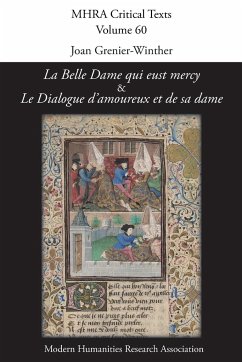
'La Belle Dame qui eust mercy' and 'Le Dialogue d'amoureux et de sa dame'
A Critical Edition and English Translation of Two Anonymous Late-Medieval French Amorous Debate Poems
Herausgeber: Grenier-Winther, Joan
Versandkostenfrei!
Versandfertig in 1-2 Wochen
25,99 €
inkl. MwSt.

PAYBACK Punkte
13 °P sammeln!
La Belle Dame qui eust mercy and Le Dialogue d’amoureux et de sa dame are two late-medieval poems in which a courtly gentleman and lady debate the merits of his pleas for her affections. In both cases, the lady is recalcitrant, dismissing her suitor’s lovesickness as a trifle, denying that she ever gave any sign of encouragement, and wishing to protect her reputation. The lady in Le Dialogue never capitulates; in contrast, the Belle Dame ends by agreeing to her lover’s suit and imagining a future in which they will joyfully live together. Both poems merit serious attention for their kins...
La Belle Dame qui eust mercy and Le Dialogue d’amoureux et de sa dame are two late-medieval poems in which a courtly gentleman and lady debate the merits of his pleas for her affections. In both cases, the lady is recalcitrant, dismissing her suitor’s lovesickness as a trifle, denying that she ever gave any sign of encouragement, and wishing to protect her reputation. The lady in Le Dialogue never capitulates; in contrast, the Belle Dame ends by agreeing to her lover’s suit and imagining a future in which they will joyfully live together. Both poems merit serious attention for their kinship with Alain Chartier’s La Belle Dame sans mercy (1424) and other poems in the so-called "Belle Dame" cycle. Their presence in numerous fifteenth- and sixteenth-century manuscript and printed collections attests to their appeal in their day. Equally as significant is their unusual bipartite stanzaïc structure, suggesting amalgamation of separate poems and/or continuations of existing poems. Such an anomaly complicates attribution of authorship and dating, but close study of La Belle Dame qui eust mercy and Le Dialogue d’amoureux et de sa dame can only enhance our understanding of the process(es) of poetic composition, as well as the mise en page and reception of literary works, in the late Middle Ages.




